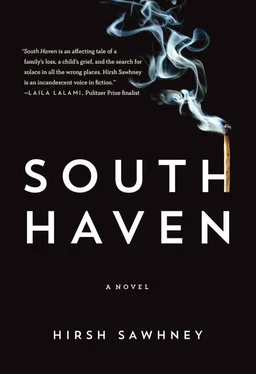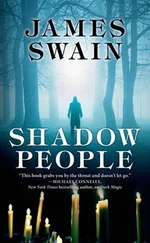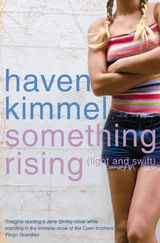When it was over, he ran the shower, sending the evidence of his misdeed down the drain. As he washed his hands, he heard the sound of voices. Oh shit, he thought. He shoved the magazine underneath some towels, then patted down his hair and tucked in his shirt. He was moving so quickly that he knocked his toothbrush into the trash bin.
Ms. Farber was taking off her boots in the hallway. She smiled without looking up. “Having fun?” she said. She kissed him on the head, then asked if Marc had called. She had asked this question twice a day for the past ten days, but Marc had only called once from Florida.
Siddharth stepped into the family room before speaking, so that she wouldn’t smell his breath. “He called, like, forty times,” he said. “I stacked all the messages in the closet.” He headed to the kitchen and pulled a piece of gum from the drawer with the scissors and coupons. Thanks to Ms. Farber, this drawer now always contained a little candy or chocolate. There were a few good things about her. Just a few. As he popped the peppermint stick into his mouth, he noticed Barry Uncle pouring drinks in the dining room.
“Boy!” said Barry Uncle. “I missed you, boy.” Barry Uncle walked into the kitchen with two whiskeys, which he placed on the counter, then pulled Siddharth into his armpit and kissed him.
Siddharth winced at the feel of his sandpaper cheeks, at the noxious smell of Old Spice, betel nut, and booze.
“I brought you a present,” said Barry Uncle.
“You did?”
“Yes sir.”
He followed Barry Uncle to the family room. Barry Uncle placed his drinks on the Kashmiri table and then picked up a plastic duty-free bag from the carpet. Just then, Mohan Lal walked in. He had already removed his shirt and tie and put on his peach-colored kurta. After giving Siddharth a hug, he asked Barry Uncle if he wanted a whiskey.
“Three steps ahead of you, boss.” Barry Uncle nodded toward the little round table. He reached into his bag and pulled out a videocassette, then handed it to Mohan Lal. “Boss, this is for you.” Next he pulled out a large, fork-like object with an intricately carved wooden handle. He turned to Siddharth. “Now what do you think of that, boy?”
Siddharth grasped the gift. It had two metal prongs. A slack length of rubber was connected to each of them, and at the center of this cord was a quarter-sized piece of leather.
“You know what it is?” asked Barry Uncle.
He nodded. “Of course.”
“A real weapon for a real man.” Barry Uncle snatched it back, then pulled and released the rubber, which gave off a dull twang. “With a good rock, you can kill a bird — a rabbit maybe, or even a squirrel.”
Siddharth took hold of it, pulling and releasing the cord as Barry Uncle had done. The Connor brothers had a slingshot, though theirs was much sleeker, with a special fiberglass attachment for extra leverage. But this slingshot wasn’t bad. It was definitely better than a crappy snake-charmer’s flute, or some other shitty toy from India.
“Thanks a lot,” he said.
“Pleasure, boy. You and me can do a little hunting come spring. Your father — he was a great one for hunting.”
Ms. Farber walked in carrying a glass of her pink wine. “Mo used to hunt? How awful. Why is this the first time I’m hearing this?”
“I could write a whole book about him,” said Barry Uncle. “But I’m not the writer.”
Grinning, Mohan Lal seated himself on the love seat. He picked up a whiskey and raised it in the air. “Cheers, chief. Chalo, let’s watch your little video.”
Barry Uncle and Ms. Farber sat down, and the trio clinked glasses.
“Siddharth,” said Mohan Lal, waving his new tape in the air, “put this in and press play.”
Siddharth sighed but did as he was told. He was about to flee to the guest room when Barry Uncle said, “Stay, boy — this is important. You should know about your culture.”
Static shimmered on the screen, but soon the words Jain & Son Productions were streaming across a blue background. Siddharth let out a muffled laugh. These graphics looked cheap, the work of amateurs. Blowing a bubble, he realized that his gum had already lost its flavor. That was the thing with Ms. Farber’s sugar-free stuff — it tasted like crap and never lasted.
The camera focused on a gloomy, vacant prison cell. Suddenly, a little blue boy with a bow and arrow flashed on the screen. He kept on flashing on and off, as if he were a ghost. He then multiplied into four distinct boy-gods, which started rotating in a kaleidoscopic fashion.
A narrator started speaking in Hindi.
Ms. Farber leaned forward, squinting and grasping her chin. “What are they saying?”
“That is the god Ram,” said Barry Uncle. He explained that Ram used to have an important temple in a place called Ayodhya, but a Muslim king came and destroyed it. “And then — surprise, surprise — that bastard invader erected a bloody mosque.”
Ms. Farber was riveted. “Jeez, it’s always the same story, isn’t it?”
Siddharth sat down beside Barry Uncle, who squeezed his knee. Barry Uncle said that some years ago, Ram had appeared in the dream of a Hindu holy man. The god urged the Hindus to demolish the mosque and rebuild their forsaken temple. Soon, little statues of Ram mysteriously appeared in the mosque, and these were further proof of Ram’s wishes.
“Don’t worry,” said Mohan Lal, draping his arm around Ms. Farber, “he doesn’t actually believe this drivel.”
“Call it what you want,” said Barry Uncle. “All movements need myths to mobilize the masses.” He poked Siddharth in the thigh. “Boy, fast-forward a bit.”
He begrudgingly got up and pressed the forward button. It was 11:23, and he didn’t want to miss the festivities in Times Square.
“Stop, stop, stop,” said Barry Uncle. “This is it. This is what we need to see.”
When he pressed play, the screen was much shakier.
“This is my own handiwork,” said Barry Uncle. “Shot it all myself.”
“Forgive me, Barry,” said Ms. Farber, “but I wouldn’t quit your day job.”
Mohan Lal chuckled, then kissed her on the shoulder.
“Hah,” said Barry Uncle. “We’ll see who laughs last.”
Siddharth remained standing, spitting his gum into an old receipt that he found in his pocket. The screen now showed a dusty Indian square with some sort of religious structure in the background.
“That’s it,” said Barry Uncle. “That’s the mosque.”
“You mean the temple?” asked Ms. Farber.
“Bright bird,” said Barry Uncle, snapping his fingers.
Thousands of men were gathered in front of the mosque. A few of them were cops with perfect mustaches, and some were grubby holy men with painted foreheads. But most were ordinary Indians — not the kind who spoke English, like Siddharth’s relatives, but the ones who rode around on mopeds with their entire families, the ones who worked as cooks and drivers. These men were wielding sticks and shouting slogans.
As Siddharth rolled his gum into a perfect ball, the men on the screen were getting angrier. A few of them jumped over a fence and bolted toward the mosque. They started hurling things at it, mainly stones, but also bricks and bottles.
The camera zoomed in on the huge dome that capped the building. It reminded Siddharth of the Colt factory near Hartford — and of that nice park with the parrots near his uncle’s Delhi home. He picked up his new slingshot, grazing its cold metal prongs against his warm cheeks.
“Boss, I hope you’re paying attention,” said Barry Uncle. “Isn’t that something?”
“Amazing,” said Mohan Lal. “I never thought I would live to see it. The Hindus have finally grown a spine.”
Читать дальше












